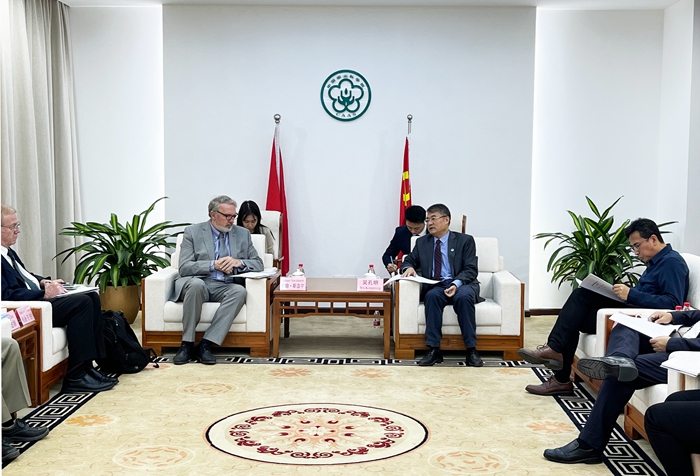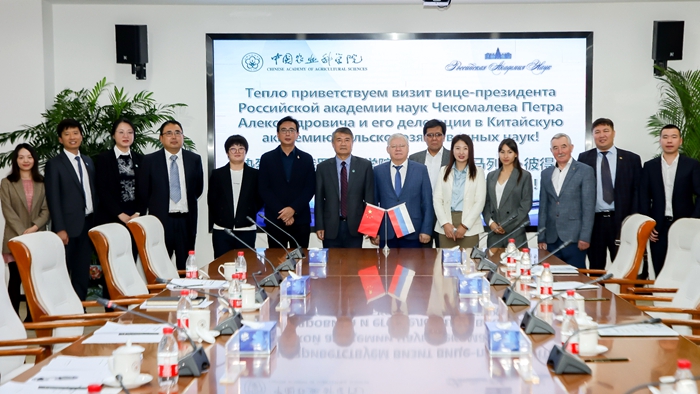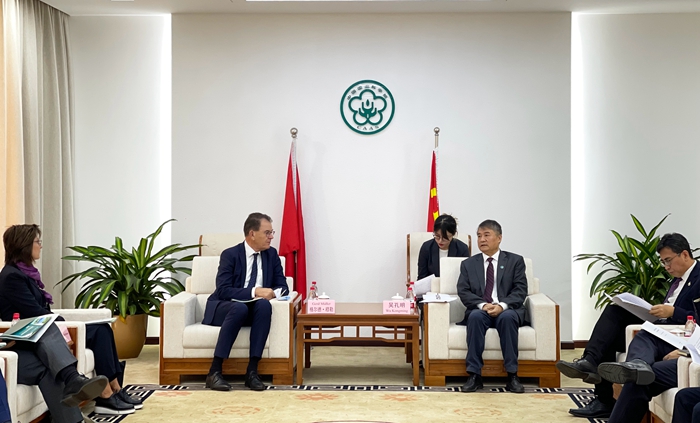Agricultural Sci-tech Innovation Cooperation Drives the Transformation of Global Agri-Food System
On October 26-27, the 7th Global Forum of Leaders for Agricultural Science and Technology (GLAST-2023), jointly organized by the Chinese Academy of Agricultural Sciences (CAAS), the People's Government of Hainan Province, the Food and Agriculture Organization of the United Nations (FAO), the Consultative Group on International Agricultural Research (CGIAR), and the International Atomic Energy Agency (IAEA), was held in Sanya, Hainan province.
Under the theme of "Science and Technology Leading the Transformation of Global Agri-food System”, the GLAST-2023 seeks to offer a premier dialogue and exchange platform for senior leaders of agricultural technology institutions and international organizations to promote sustainable agricultural development through technological innovation, amidst the immediate aftermath of the COVID-19 pandemic. While the world is facing with numerous challenges affecting global food security, over 580 delegates from more than 50 countries' worldwide, spinning government departments, agricultural research institutions, and 16 international organizations to GLAST-2023and its 6 side events explored a broader, higher-level, and more in-depth new paradigm of open cooperation in agricultural science and technology.

Mr. Li Jinxiang, Chief Veterinary Officer of Ministry of Agriculture and Rural Affairs of China (MARA), reaffirmed the significance of collaborative efforts in science and technology innovation to promote the global agri-food system transformation. Li pointed out that the Chinese government has always attached great importance to food and agricultural production. In recent years, China's grain production capacity has been continuously enhanced, further guaranteeing national food security. He reviewed China’s commitment in South-South cooperation under the Global Development Initiative (GDI) and the practices in sci-tech innovation, and declared the support in international cooperation initiatives put forward in the event. Li put forward three suggestions for promoting global agricultural technology innovation and governance in the future: Firstly, to actively support and participate in collaborative initiatives advocated by international organizations; secondly, to work together to promote agricultural technology innovation; thirdly, to deepen South-South cooperation in the fields of agricultural science and technology.

Prof. Wu Kongming, President of CAAS, said in his opening speech that, in recent years, the contribution rate of China's agricultural scientific and technological progress steadily increased, and China's comprehensive agricultural production capacity was significantly improved. CAAS, as the largest and most comprehensive national agricultural research institution in China, achieved a number of major original achievements with international advanced levels, and made positive contribution to the modernization of China's agriculture and rural areas and to global agricultural science and technology progress. Wu stated that CAAS is committed to continuously foster international cooperation, provide innovation-driven solutions and ultimately build a more efficient, inclusive, and sustainable agricultural production systems.

Dr. Qu Dongyu, DG of FAO emphasized that “During my second term as FAO Director-General, I have an even stronger vision to advance the science- and evidence-based transformation of global agrifood systems. A global forum such as GLAST can play a pivotal role in ensuring that science and technology drive this transformation.”
Distinguished international experts and policy advocates, including Prof. Mei Xurong, Vice President of CAAS, Dr. Arthur Mol, President of Wageningen University in the Netherlands, Dr. Ismahane Elouafi, Chief Scientist of FAO, and Dr. Johan Swinnen, Director General of the International Food Policy Research Institute, delivered keynote speeches at the Forum.
Experts and scholars from both China and abroad engaged in robust discussions and exchanges on various topics, such as improving agricultural productivity, cutting-edge and game-changing technologies, as well as rural revitalization and smallholder development. These discussions yielded new ideas and measures in ensuring food security, mitigating climate change, and addressing the multifaceted challenges of agri-food system transformation. Collectively, participants advocated for a much closer and more open partnership in agricultural scientific and technological innovation.
The Forum adopted and released the "Sanya Declaration." Attendees unanimously believed that GLAST is a vital platform for global agricultural technology innovation and governance, and emphasized the need to further value and utilize this mechanism to integrate innovative resources, boost international collaborative innovation, and jointly construct an agricultural technological community of a shared future. At the same time, delegates actively praised the "From Genome-to-Phenome: Deciphering Crop Genetic Resources (G2P) International Mega Science Project ", which was jointly launched by CAAS, international agricultural research organizations and multiple national agricultural research institutions. It is believed that the collaborative efforts in exploring crop genetic resources and establishing public products and platforms might promote a new wave of green revolution. In the declaration, participants also welcome the initiative to establish the "China-Africa Agricultural Science and Technology Innovation Alliance (CAASTIA)" proposed by CAAS and the African Academy of Sciences (AAS), aiming at creating an open and shared platform for joint development in agricultural technology and industry both in Africa and in China.
The Global Forum of Leaders for Agricultural Science and Technology was firstly initiated by CAAS in 2006 and co-hosted with international organizations including FAO and CGIAR. It promotes dialogues among international leaders in agricultural science and technology, builds up strategic partnerships among international stakeholders, and facilitates a series of substantial collaborative outcomes.
-
 Nov 09, 2023CAAS President Meets with IFPRI Director General
Nov 09, 2023CAAS President Meets with IFPRI Director General -
 Nov 09, 2023CAAS President Meet with Vice President of Russian Academy of Sciences
Nov 09, 2023CAAS President Meet with Vice President of Russian Academy of Sciences -
 Nov 09, 2023CAAS President Meets with UNIDO Director General
Nov 09, 2023CAAS President Meets with UNIDO Director General -
 Nov 07, 2023Strengthen International Cooperation and Knowledge Sharing to Promote Sustainable Fall Armyworm Control Globally
Nov 07, 2023Strengthen International Cooperation and Knowledge Sharing to Promote Sustainable Fall Armyworm Control Globally -
 Nov 02, 20232023 International Symposium on Plant Biosafety Held in Yunnan
Nov 02, 20232023 International Symposium on Plant Biosafety Held in Yunnan
